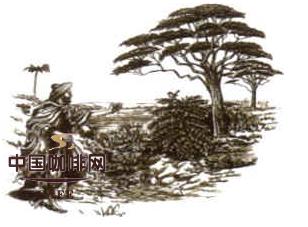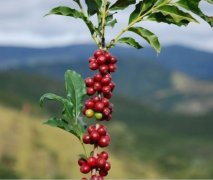Coffee Culture Common Sense Coffee Spread History (I)
622
Muhammad, the prophet of Islam, led the believers to migrate from Mecca to Medina, set out to establish a church state, and then developed into a powerful empire spanning Central Asia to the Liberian Peninsula. Ethiopia, the origin of coffee, was included in the Ilan Empire and remained independent as a Christian country.
At the beginning of the 11th century
Coffee began to spread from Ethiopia to the Arabian Peninsula.
In the records kept by the Arab medical scientist Larsus and the philosopher Abikener, it is recorded that coffee was forbidden at that time, and even coffee was called the drink of the devil Satan, during this period, the fruit and seeds were fried in the raw state, which became the secret medicine of some Islamic sages.
Around 1258
According to legend, coffee beans were found.

The Arab monk Shake Omar found coffee beans.
When the Arab Shake Omar was exiled in Wassaba, far from their hometown of Moka, he saw the birds in the mountains pecking at a kind of red fruit and putting it into their mouths. This is coffee. It is said that Omar recovered from fatigue and replenished his strength after eating the fruit.
The second half of the 13th century
The roasting of coffee beans began, and at this time in Arabia, simple coffee roasting utensils began to be made.
1454
Coffee is open to the general public, thanks to Gemerting, the saint of Aden. As part of the secret medicine used by religions, coffee, which is not known by everyone, began to become understandable in the Arabian Peninsula, and local coffee cultivation began in Yemen.
1492
With the discovery of the New World, Columbus opened the so-called era of great navigation in order to reach the West Indies. The invasion of Asia, Africa and America by European countries became the first step in the formation of colonies, and the discovery of new shipping routes made trade in Europe, Islamic society and Asia active. Japanese products such as spices, silk fabrics and ceramics can already be transported by ship.
The beginning of the 16th century
Arabs began to grow coffee trees in Sri Lanka, and the land was one of the world's largest producers until rust in 1886 wiped out coffee farms.
1510
Coffee was introduced to Cairo. The following year, Karl Bay, acting governor of Mecca, issued a coffee ban, but the ban was withdrawn by the king.
1517
Coffee was brought to Istanbul to benefit from Sherim I of Ottoman Turkey. This year, Ottoman Turkey ruled Siasia as the successor to the Islamic Empire. Zen, a descendant of the previous dynasty, gained the title caliph and held the suzerainty of Islam.
1530
The coffee spread to Damascus. The following year, the first defense of Vienna was made by Suleiman of Ottoman Turkey.
1554
The debut of the world's earliest real coffee shop in Istanbul, called "Kanes", also had an impact on later European coffee shops. from then on, after several ups and downs, coffee finally took root in Arabia and settled as a drink in the Turkish world.
Important Notice :
前街咖啡 FrontStreet Coffee has moved to new addredd:
FrontStreet Coffee Address: 315,Donghua East Road,GuangZhou
Tel:020 38364473
- Prev

The History of the spread of Fine Coffee Culture and Common sense Coffee (2)
The first European description of coffee in 1573 was through German doctors staying in Syria. In the second half of the 16th century, the European people who traveled on the east coast of the land gradually spread. The British East India Company was established in 1660 and the East India Company was established in the Netherlands in 1602. The East India Company refers to the trade between Asia and Europe, South Asia and the East in the 17th and 19th centuries.
- Next

When is the first peak period for the development of coffee planting industry in China?
By the end of the 1940s, according to recorded figures, there were 2173.33 hectares of rubber plantations on Hainan Island, with a total of 867600 rubber trees, with an annual output of 199,000 tons of dry rubber, more than 300,000 coffee plants and an annual output of 1 ton of coffee beans. According to a survey in the early 1950s, a large number of coffee was left in Fushan area of Chengmai County, with a total of 70,000 plants, including more than 40,000 plants in Daji Village and Fushan Farm (Hongguang Farm) 1
Related
- How did the Salvadoran coffee industry develop in Central America?
- What exactly does the golden cup extraction of coffee mean?
- The Origin of Coffee flower
- [2023 Starbucks World Earth Day] there are more meaningful things besides free Starbucks coffee!
- What kind of coffee is there in Spain? 9 Flavors of Spanish Coffee
- Aromatic African coffee| Kenya's coffee culture and historical production area
- Liberica Coffee Bean knowledge: the characteristics of Liberian Coffee beans of the three original species of Coffee beans
- The origin and formula of Spanish latte introduces the taste characteristics of Bombon coffee in Valencia, Spain.
- How to adjust the solution of over-extracted coffee
- What is the tasting period of coffee beans? What is the period of coffee and beans? How should coffee wake up and raise beans?

